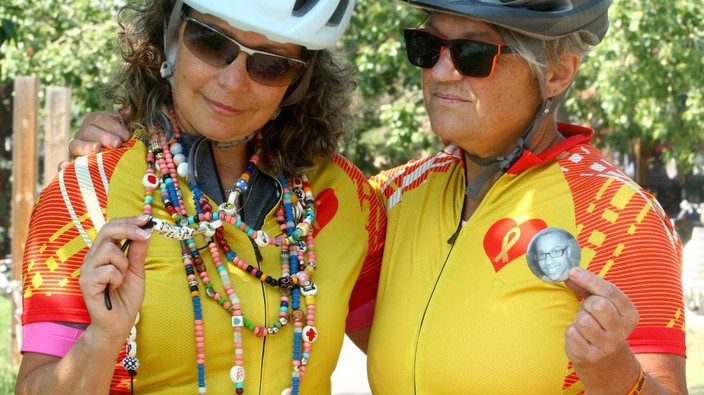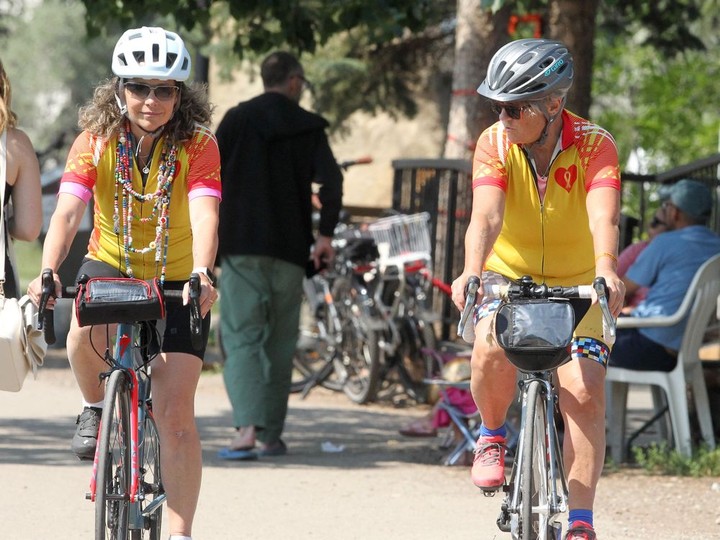bereaved calgary moms ride to support children with cancer
a calgary team is raising money for kids cancer care by biking between 75 to 115 kilometres on sunday, many of whom have lost a child of their own to the disease.

dale zukowski and anne cameron pose for a photo on the bow river pathway prior to an upcoming fundraiser. the bereaved parents of cancer victims doing a bike fundraiser for cancer research and plan to cycle from banff to lake louise tomorrow. saturday, july 17, 2021. brendan miller/postmedia
brendan miller/postmedia
by: brittany gervaisstanding on her bike by the bow river, dale zukowski holds the long, beaded necklace she’s wearing in her hands.each bead represents a major procedure, chemotherapy treatment, needle, or friendly hospital visit her son joel zukowski had over six years. diagnosed with brain cancer at 10 years old, joel died of the disease at the age of 16.“he was a great kid. he was a light, he had a strong faith, and his personality just shined,” dale said. “that’s why we’re doing this ride as bereaved parents, because i feel like i’m spending time with joel right now.”dale is part of a team of 16 people, many of whom have lost a child of their own to the disease, biking through the bow valley parkway on sunday to raise money for children with cancer.the cycling team, called2legit2quit, is one of 18 teams participating in the second annualkids cancer care cycle challengeto raise funds forkids cancer care. so far, 2legit2quit has raised $15,354 of the combined $150,000 raised.anne cameron, the team’s captain, lost her son ty sparks in 2012 after a long battle with acute myeloid leukemia. she started biking last year and plans to ride 75 kilometres on sunday.“i ride for these kids. i know more kids in heaven than i do that survived cancer, it’s sickening,” anne said. “people have no idea of childhood cancer, they just don’t know.”neither joel nor ty ever got a chance to graduate high school, go to college, or fall in love because of cancer. yet, anne said ty had a great sense of humour and loved to make people laugh.“the nurses just loved him,” she said.cancer is the number one disease killing children from age six months to young adulthood, according to the childhood cancer canada foundation, with one in five children dying from the disease.despite this, research funding for childhood cancers represented nearly five per cent of overall cancer research investment in 2016, according to the canadian cancer research alliance.the treatments that exist today are incredibly harsh, especially for children. if they do survive, they are still at risk for long-term health problems as a result of their cancer and its treatment.
advertisement

“i think more money should be allotted to cancer research for treatments for better treatments that aren’t so harsh and don’t cause so many long-term side effects,” dale said.“that’s why the donations are so important, because medicine needs research, and medical research needs funding. and our government doesn’t recognize that it’s underfunded.”ty didn’t have cancer when he died, anne said. he was cleared of cancer but didn’t recover from the treatments used to fight it.“he was mostly in his room, mostly in isolation. he was diagnosed at 13 years old and went to heaven when he was 17 years old. he didn’t have cancer that whole time, but he spent most of it in the hospital fighting.”both anne and dale said they are doing the bike ride to give back to kids cancer care, a charitable organization that helps families fighting childhood cancer in alberta.forty per cent of proceeds to kcc are used to fund camp programs, according to the charity’s website, with 20 per cent going to research and hospital programs.gail corbett, kcc director of marketing and communications, said she feels like she meets “the best of humanity” in her role.“i get families who have gone through this incredible journey that completely changes you. and they’re just grateful to have your children alive or grateful for someone to show them love and support,” corbett said.“it is an honour to be able to share in any part of their journey.”anyone who wants to donate to kcc cycle challenge or contribute to the 2legit2quit team can visit kidscancercare.com.
 3 minute read
3 minute read





